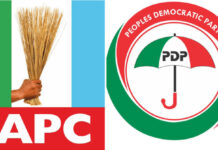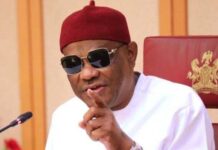THE Presidential candidate of the Social Democratic Party, Prince Adewole Adebayo, has accepted to publicly declare his assets.
This revelation was made today by the Socio-Economic Rights and Accountability Project (SERAP).
“2023: Social Democratic Party (SDP) Presidential Candidate @Pres_Adebayo has publicly agreed to publish his assets now, and reject vote-buying before and during the elections. Other presidential candidates are yet to make any commitment,” the non-profit organisation wrote in a tweet this afternoon.
It added, “2023: We’ve asked Atiku, Tinubu, Obi, and other presidential candidates to immediately publish their assets and reject vote-buying before and during the elections”.
Recall that SERAP had sent an open letter to presidential candidates ahead of the February 2023 presidential election, urging them to urgently publish details of their assets and liabilities and to publicly commit to rejecting vote-buying and electoral bribery before and during the elections.
SERAP said, “While there is no constitutional requirement for presidential candidates to publish their assets and liabilities before elections, doing so would show that you can stand up for transparency in assets declaration by public officers if elected.”
In the open letter dated June 11, 2022, and signed by SERAP deputy director, Kolawole Oluwadare, the organisation said, “The public office is a public trust. As such, the voters deserve to hear from presidential candidates regarding what they will do about issues of public interest, particularly with respect to integrity, selflessness, openness, accountability, human rights, and the rule of law if elected.”
SERAP said, “As you and your parties prepare for presidential election campaigns, we hope that you will seize the opportunity to show your commitment to addressing these fundamental issues of public interest by immediately publishing details of your assets and rejecting vote-buying, intimidation and harassment.”
The letter read in part, “Publicly committing to these issues will also show the voters that if elected, you would act solely to protect the public interest; and avoid placing yourself under any obligation to people or organisations that might try inappropriately to influence you in the discharge of your constitutional duties.”
“It would also show that you would be accountable to the public for your actions and submit yourself to the scrutiny necessary to ensure this.”
“Your public commitment to these issues will also demonstrate to the voters that if elected you would act and take decisions in an open and transparent manner, and that you would not withhold information from the public unless there are clear and lawful reasons for so doing.”
“Now is the time to show the voters that it will be no business as usual, and to make a public commitment on issues that if addressed would strengthen Nigeria’s anti-corruption and human rights records, and improve access of Nigerians to public goods and services.”
“SERAP also urges you to publicly commit to probing the spending of security votes since the return of democracy in 1999, and widely publishing details of spending of security votes; finding the missing N11 trillion meant to provide regular electricity supply for Nigerians; as well as obeying court orders and the rule of law if elected.”
“Widely publishing your assets before the elections would also show your principled stand on transparency and accountability in the management of the country’s resources.”
“Making asset declarations open would ensure that leaders do not abuse their powers for personal gain and allow civil society to hold leaders to account. If leaders are seen to live beyond their means, an asset declaration can be a starting point for investigations.”
“The practice of vote-buying and electoral bribery by politicians have characterised elections in the country for many years, preventing political equality and fair electoral competition. Yet, no body politic worthy of being called a democracy entrusts the selection of leaders to a process of auction or barter.”












Prince Adewale Adebayo is the youngest among the rest of the candidates. A man with a vision for Nigerian youth
Accountability, openness and justice is the foundation of good governance. With SDP we stand!
SDP will definitely win Ekiti.